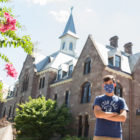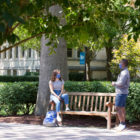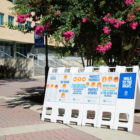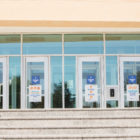Updated August 27, 2020 with a response from South Orange Township officials.
Seton Hall University in South Orange says that it has spent more than $7M to ensure a safe restart for its hybrid fall semester amid the COVID-19 pandemic, reporting that the University’s efforts exceed what is required by the Centers for Disease Control and Prevention for campus environmental health and safety protocols.
The reopening includes an extensive public information campaign aimed at students, which includes them taking the Seton Hall Pledge and performing daily screenings (#campusclear app). All students are required to wear masks, on campus and off, with the only exceptions for dining or when alone in a room.
South Orange Township officials say that the University’s restart plan was received by the Department of Health on August 13 and that the township “did not participate in its creation or review.” However the township is “eager to be involved moving forward in partnership with the University.”
As of August 24, the University had reported 3 on-campus cases of COVID-19 since August 15. The three individuals who tested positive are in isolation, according to the University. The University says that it reports all cases to the South Orange health department.
The University reports that all residential students are tested when they arrive on campus, as well as students “who are at higher risk due to activities in which they participate (i.e., athletics, health clinicals)”. Other testing, including for commuter or off-campus students, appears to be reliant on self-reporting. However, all students, faculty and staff are required to do “mandatory training for COVID-19 sanitation (including handwashing and disinfection of spaces and surfaces) and social distancing practices and protocols as an expectation for our members returning to the University in both on campus and off-campus settings.”
According to a communication from the University President Joseph Nyre (see below), residential students from out of state are being asked to voluntarily self-quarantine upon arrival: “As a service to our students, those arriving on campus from states on New Jersey’s quarantine list will be provided single-occupancy rooms for a state-advised, voluntary 14-day self-quarantine and will have access to campus services and supports. Unfortunately, the state has indicated that quarantining at home in any of the states on the list (prior to arriving in New Jersey) is no longer valid.”
The Setonian reports that on-campus students who violate the pledge and state and federal guidelines are subject to punishment stretching “from warnings up to residence hall suspensions and expulsions” and “would reflect both a student’s past disciplinary history as well as the ‘seriousness of the violation.'”
Regarding off-campus violations, “The University will rely heavily on its existing relationship with the South Orange Police Department to gather incident information on suspected transgressions. Students who are found to have violated the code of conduct can be fined as much as $500 per-resident in the house for a first-time violation. A second violation could result in a fine of up to $1,000 per-resident, while a third violation could culminate with potential suspension from the University.”
In response to a request for information from Village Green, Seton Hall University shared its Restart Plan and answered questions about safety precautions being taken as thousands of students return to its South Orange, NJ campus. (See the full response below.) Students started moving into housing on and off campus in mid-August, with online classes starting on August 24 and in-person classes and indoor dining set to resume on August 31.
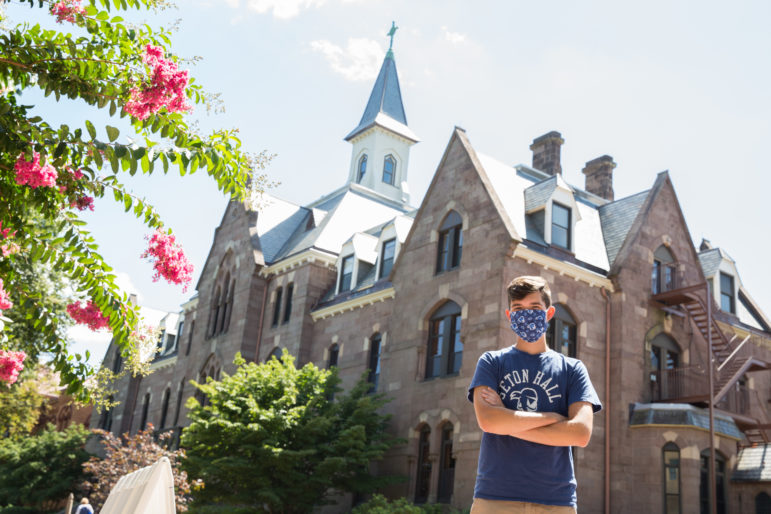
Photo courtesy of Seton Hall University
Village Green made the request after reading reports of the first on-campus COVID-19 cases since April, reported in The Setonian, the University’s student-run newspaper.
The University said that it had been “tremendously transparent” regarding its reopening plan, “sending regular communications to thousands of students, families, faculty, staff and administrators and alumni.” However, that transparency has not included public outreach to local media, prior to Village Green’s request for information.
Village Green also reported South Orange officials’ concerns about the reopening voiced during the August 24 South Orange Board of Health meeting; no representatives of Seton Hall University spoke at the public meeting nor at any previous Board of Health meeting during the pandemic. South Orange officials said they would be meeting with Seton Hall officials weekly going forward and that residents could report any violations by students via a form on the SHU website here: https://www.shu.edu/health-intervention-communication/contact.cfm.
The response from Seton Hall’s media relations spokesperson reads that the reopening plan “is the result of the collective, months-long efforts of more than 140 Seton Hall University faculty, clergy, administrators, staff and students and regular consultation with local, state, national and international health experts.”
The University contends that it “was in extensive communication with village officials, as email, phone and text logs demonstrate.”
Regarding testing, the University spokesperson reports: “The University testing protocols are more robust than municipal or government testing regimes. The University will immediately test all students who present with COVID-19- related symptoms, even minor symptoms, as well as any student who is identified as having been exposed to someone diagnosed with COVID-19. This testing is done by the University’s Health Services on the South Orange campus and includes prompt turnaround time for results.”
Find updates and information on reported Seton Hall-related COVID-19 cases here.
The University spokesperson provided the following links to University communications related to the reopening:
https://www.shu.edu/health-
https://www.shu.edu/health-
The following is from Seton Hall University in response to a request for information from Village Green. The questions are Seton Hall’s interpretation of questions from Village Green across two phone calls earlier this week (and possibly reflect questions and comments from South Orange officials during a meeting not attended by press on Monday):
The plan was confirmed by the State of New Jersey’s Office of the Secretary of Higher Education. It meets or exceeds the Centers for Disease Control and Prevention’s (CDC) recommendations for campus environmental health and safety protocols. Central to the Restart Plan is partial in-person instruction through the HyFlex modality.
Governor Murphy’s Executive Order No. 175, issued on August 13, permits in-person instruction at New Jersey colleges and universities. Following significant consultation with state officials, Seton Hall announced it would start remote instruction on August 24, and begin reduced-density, socially distanced, in-person, HyFlex instruction on August 31.
Campus preparations have been underway throughout the summer. Seton Hall has acquired and installed the HyFlex-related technological equipment, committing additional training, making capital and infrastructure enhancements in space and air-flow optimization systems, and investing over $7,000,000 to provide a safe and healthy environment – in the residence halls, in the dining areas, in the workplaces, and in the classrooms.
Environmental efforts include new layouts, signage and increased sanitation measures, which are easy to recognize. Others, such as upgraded ventilation systems, are not noticeable but are equally vital. These improvements have been confirmed by the State of New Jersey and meet or exceed CDC recommendations.
The campus preparations are complemented by the extensive education and promotion of personal responsibility for the health of our entire community by taking and adhering to the Seton Hall Pledge. Upon arriving on campus, students and employees receive welcome packages that include protective masks, hand sanitizer and a copy of the Seton Hall Pledge.
HyFlex:
Central to the Restart Plan for the fall 2020 semester is a hybrid, flexible (HyFlex) blended approach to classroom instruction. It ensures in-person, reduced-density learning while offering students the option to pursue their studies entirely in a remote fashion. Students who choose HyFlex will experience a blend of in-person and remote, real-time instruction, with live feeds. There are cameras in the classes. Desks are spaced for physical distancing. Plexiglass placed at faculty members’ desks.
This creates physical distancing for those choosing an in-person environment while accommodating students who choose the remote option for the semester. Students are split into groups that will alternate online and in-class participation to reduce classroom and campus density. Faculty were also provided opportunity to request adjustments and accommodations; this further reduced campus density.
Some courses have been converted to fully remote instruction. In the case of a resurgence of
COVID-19, the HyFlex model can be transitioned to a fully remote model for a period of time or for the remainder of the semester.
Equally important, the HyFlex plan allows the University to toggle to full remote should circumstances warrant.
How are we being a good neighbor? There has been a lot of chatter and concern of students living in Village and Shopping in Village and not following social distancing and masking.
Questions on Transparency, ie. when reporting positive cases.
Seton Hall has called South Orange home since 1860. As the largest employer in the Village, and a significant economic driver for the community and its businesses, we appreciate the importance of the relationship between the University, the Village leadership, and the residents.
The University immediately notifies South Orange health officials and posts positive cases to its website. Any assertion of a lack of transparency is simply incorrect.
It is important to note that in recent months, students rented homes and apartments in the community for this academic year. Because of the binding nature of leases, many students were returning to live in South Orange, and other university towns across the country, whether the University provides in person classes or not.
We continue to make decisions with the health and safety of our entire community paramount. In response to the rising rates of COVID-19 infections in other countries, the University was one of the first to shutdown study abroad to any destination. Then, in mid-March, Seton Hall quickly transitioned, without the benefit of any government guidance, to remote learning and immediately began planning for fall 2020.
Throughout that time, Seton Hall health officials have been in regular contact with their counterparts in the Village of South Orange, while also consulting state, federal and international health authorities and published recommendations. Their guidance has resulted in protocols and policies confirmed by the State of New Jersey for the University’s Restart Plan this fall, including prompt reporting of any COVID-19 cases to local health officials.
Seton Hall has been tremendously transparent, sending regular communications to thousands of students, families, faculty, staff and administrators and alumni. Those announcements are also posted on the University’s web site. These email communications are supplemented through vigorous social media promotion, the dissemination of training and information videos, and frequent updates to the web site, including an FAQ page. Confirmed cases are reported on the website and accessible for all to see at the reported cases link.
Health officials from the University and Village will be meeting weekly. Additionally, community members may contact our Health Intervention and Communication Team with questions through a form on our website at https://www.shu.edu/health-intervention-communication/contact.cfm.
Several educational videos have been created. We encourage you to view them at:
Restart Plan video https://youtu.be/tj0hVePU4uk
Importance of Taking The Seton Hall Pledge
Why I Took The Seton Hall Pledge
https://www.youtube.com/watch?v=BQL_97-bfkE
How many students have testing positive?
As stated on our website and communicated to Village officials, to date, the University has
conducted over 1,500 COVID-19 tests. Three have come back positive, for a positivity rate of .2 percent.
None of the cases were contracted at Seton Hall. Thankfully, Seton Hall’s testing protocol identified asymptomatic NJ residents who were unaware they were carrying the virus. The University continues to strongly encourage municipal and governmental authorities to provide greater access to testing for the general public. Many people in NJ across the country likely do not knot that have had or are currently carrying the virus.
The testing protocol provides timely results and is administered as residential students first arrive on campus. These cases were promptly identified as a result of the comprehensive testing protocol outlined in the Restart Plan.
South Orange health department officials are immediately notified by Seton Hall University’s Health Services regarding any positive tests and remain in contact regarding subsequent contact tracing actions. Contact tracing is conducted by the University’s Health Services office to provide follow up to identified cases.
What are our protocols for testing? How are we checking on non-residential students who live in the community and those who shop in the community?
We have mandatory training for all students, faculty and staff on COVID-19 sanitation (including handwashing and disinfection of spaces and surfaces) and social distancing practices and protocols as an expectation for our members returning to the University in both on campus and off-campus settings.
The University community has agreed to a social contract and shared responsibility of actions and behavior, taking the Seton Hall Pledge. This includes daily self-screening and self-monitoring through a phone app. This is supplemented by abundant reminders to follow proper hygiene and sanitation, maintain appropriate physical distancing in all settings, both on and off campus, appropriately wear face masks, coverings and PPE, and abide by all state regulations and Seton Hall University health policies.
The University testing protocols are more robust than municipal or government testing regimes.
The University will immediately test all students who present with COVID-19- related symptoms, even minor symptoms, as well as any student who is identified as having been exposed to someone diagnosed with COVID-19. This testing is done by the University’s Health Services on the South Orange campus and includes prompt turnaround time for results. Through Health Services, the University also will perform tests of students who are at higher risk due to activities in which they participate (i.e., athletics, health clinicals).
Following University protocols, non-residential students return home to quarantine for 14 days and follow up with their personal primary care provider. Health services and the local health department remains in contact with these students and each other.
All the protocols for testing and screening can be found on our Return to Fall Website through www.shu.edu/fall2020
The University is literally working around the clock to deliver its mission. In doing so, it is adhering to the principles from Catholic social teaching, exceeding CDC higher education considerations, and values the wellbeing of the people in its community, including the residents in our home of South Orange.
Myths, rumors and misinformation are permeating our community and country as a result of fear and uncertainty. I do hope that the above clarifies and corrects any misinformation, as the University remains committed to continuing its communication with Village officials from the Department of Health to continue our ongoing communication and coordination as we work together to stop the spread of COVID-19.
Photos courtesy of Seton Hall University:

